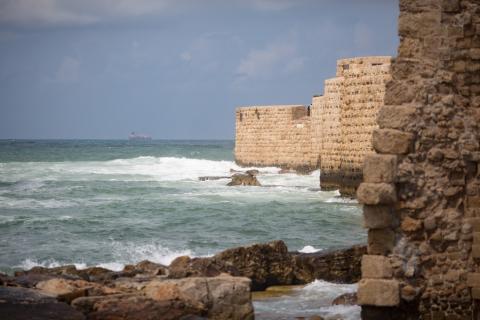Here’s a story of Ugo Giachery (a Hand of the Cause) who went through the process while on pilgrimage: The first time I beheld the Shrine of Bahá’u’lláh, I was overcome by deep emotion and, as I walked close to it, trepidation and excitement made it almost impossible for me to advance further. Years of expectation surged in my mind, and the desire to prostrate myself upon the Holy Tomb, for a long time the goal of my life which was now becoming reality, was at the same time urging and restraining me. Perplexity held me fastened to the ground, and if it had not been for the gentle calling of my escort, I should have remained in that state for quite a long time. It is not possible to describe the feeling of exaltation and awe which overtook me upon entering the door of that Sacred Sepulchre! The world with all its immensity whirled away into nothingness with the rapidity of lightning. I was alone, relieved of cares and thoughts, free from all attachments, as if suspended between heaven and earth. I could only feel the fast beats of my heart and the humming of infinity. There was nothing but light all around me and a powerful fragrance never known before. As in a dream, transported by the attraction exercised by the mystery emanating from the most Blessed Spot in creation, I reached the portal leading to the inner chamber of the Tomb and fell on my knees and placed my forehead on that hallowed Threshold. I felt the need to conceal my face in the ground, as my whole being was gripped by a strong sensation of guilt - guilt for having arrived so late in my life. I could hear myself saying: Forgive, forgive, forgive ... for a long time, and then a great peace filled me. My whole past life came before me as an irrelevant episode of eternity, while the present and the vision of the future filled me with unprecedented joy and the lightness of freedom. Glory, immense glory, through a path which precluded any return; a complete sublimation in the transcendency of creation; the certainty of nearness to the 'Mighty Root' from which the greatness and the perfection of the whole universe had been brought to earth. Prayers of thanksgiving and praise came to my lips; streams of unending tears flowed from my eyes, while in my thought all those whom I loved, like a legion of luminous entities, headed by none other than Shoghi Effendi himself, passed rapidly, moving forward and rejoicing with me. When I came back to the reality of this contingent world, I felt that something had happened to me; my heart was filled with contentment, stability, expectation and unfading certainty. All those I loved became closer to me than ever before. Shoghi Effendi was eternally linked to my soul, while the problems of everyday life disappeared as small clouds swept by a fresh wind. That same night, at the dinner-table, upon inquiry by the Guardian as to my impression of the Shrine of Bahá’u’lláh, I tried to express the tumult of my feelings. Shoghi Effendi looked at me with tenderness and understanding, and explained the influence upon the human soul of the earthly remains of the Messengers of God. 'They are, no doubt, endowed with a tremendous spiritual influence and far-reaching power... in the sense that Their dust was the physical mirror of the greatness of God.'
Repentance
In spite of the harrowing afflictions that the Blessed Beauty suffered at the hand of this half-brother, He, in the Kitáb-i-Aqdas, reminds Mirza Yahya of the early days of his life when He, as a token of His bounty, nurtured him so that he might become a worthy instrument for the service of the Cause. He asks him to call to mind the times when he used to be summoned to stand before Bahá’u’lláh and take down the verses of God which were revealed by Him, counsels him to return to God after his shameful rebellion against His Manifestation, and assures him that God would forgive all his iniquities should he now repent and beg forgiveness from Him.
It happened that during the Baghdad period, the well-known Ilkhani, son of Musa Khan-i-Qazvini, received through Siyyid Javad-i-Tabataba'i an audience with Bahá’u’lláh. Siyyid Javad on that occasion made a plea in the Ilkhani's behalf, saying: "This Ilkhani, Ali-Quli Khan, although a sinner and a lifelong creature of his passions, has now repented. He stands before You with regret as to his former ways, and from this day forward he will not so much as draw a breath that might be contrary to Your good pleasure. I beg of You, accept his repentance; make him the object of Your grace and favor."
Bahá’u’lláh replied: "Because he has chosen you as intercessor, I will hide away his sins, and I will take steps to bring him comfort and peace of mind."
The most renowned of those repentant souls was the vigorous commander Hurr, who had obstructed all roads to Husayn. His transformation took place in the depths of night, nor could his soldiers believe their eyes when they beheld this man of courage trembling like a leaf in a winter storm. "But we have never seen you in fear, even in the midst of the most terrifying battles," they cried. "I find myself between heaven and hell," was Hurr's reply. "My soul cries out and cannot bear these torments of hell." In the faint light of dawn, he charged his steed towards Husayn, to express his penitence and beg forgiveness. When he had received the Imam's grace and assurance, he faced the army of Ibn Sa'd and chided them in loud tones, hoping to awaken their dormant souls. But alas! Those who were his comrades and under his command, attacked and killed him in an outburst of despicable ferocity.
